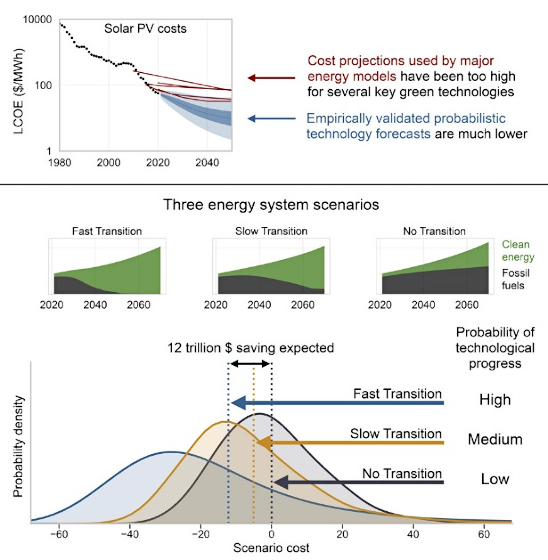“There is a pervasive misconception that switching to clean, green energy will be painful, costly, and mean sacrifices for us all — but that’s just wrong,” said Oxford professor and study co-author Doyne Farmer.” A windmill farm in Eastern Washington state, USA. Photo by Dennis Hamilton.
Rapid green energy transition by 2050
could save the world at least $12 trillion
by Jessica Corbett – Common Dreams
Peer-reviewed research released Tuesday by a team at the University of Oxford reveals that transitioning to 100% clean energy within the next three decades could save not only lives and the planet but also $12 trillion.
Accelerating the transition to renewable energy is now the best bet not just for the planet, but for energy costs too.
The study from the Oxford Martin Program on the Post-Carbon Transition, published in the journal Joule, comes as scientists continue to warn about the climate and health impacts of fossil fuels, and governments party to the Paris agreement prepare for COP27, a November summit in Egypt.
“There is a pervasive misconception that switching to clean, green energy will be painful, costly, and mean sacrifices for us all—but that’s just wrong,” Oxford professor and study co-author Doyne Farmer said in a statement. “Renewable costs have been trending down for decades.”
“They are already cheaper than fossil fuels in many situations, and our research shows that they will become cheaper than fossil fuels across almost all applications in the years to come. And if we accelerate the transition, they will become cheaper faster,” he explained.
Farmer also highlighted that currently, “the world is facing a simultaneous inflation crisis, national security crisis, and climate crisis, all caused by our dependence on high cost, insecure, polluting, fossil fuels with volatile prices.”
“This study shows that ambitious policies to dramatically accelerate the transition to a clean energy future as quickly as possible are not only urgently needed for climate reasons, but can save the world trillions in future energy costs, giving us a cleaner, cheaper, more energy secure future,” he said.
The study’s lead author, Rupert Way, pointed out that “past models predicting high costs for transitioning to zero carbon energy have deterred companies from investing and made governments nervous about setting policies that will accelerate the green transition and cut reliance on fossil fuels.”
“But past models have overestimated key green technology costs again and again, leaving modelers to play catch-up as real-world costs plunged over the last decade,” he stressed.
As the researchers detailed in their paper: “We use an approach based on probabilistic cost forecasting methods that have been statistically validated by backtesting on more than 50 technologies. We generate probabilistic cost forecasts for solar energy, wind energy, batteries, and electrolyzers, conditional on deployment. We use these methods to estimate future energy system costs and explore how technology cost uncertainty propagates through to system costs in three different scenarios.”
The first scenario, which they call the “fast transition,” would feature an end to fossil fuels by 2050; this is the path that they estimate would save the world $12 trillion. The second scenario, or “slow transition,” would involve shifting to clean energy by around 2070. The third scenario is “no transition,” meaning the energy system would remain dominated by fossil fuels.
“Compared to continuing with a fossil fuel-based system,” the study states, “a rapid green energy transition will likely result in overall net savings of many trillions of dollars—even without accounting for climate damages or co-benefits of climate policy.”
“Only a few years ago, net-zero by 2050 was believed to be so expensive that it was barely considered credible, yet now even the most pessimistic models concede that it’s entirely within reach,” noted Way. “Accelerating the transition to renewable energy is now the best bet not just for the planet, but for energy costs too.”
The study was released the same day as a new United Nations report which, in the words of UN Secretary-General António Guterres, “shows climate impacts heading into uncharted territories of destruction.”
Emphasizing that the global community is “still way off track” in terms of the Paris goal of limiting temperature rise this century to 1.5°C, Guterres—who just visited flood-ravaged Pakistan—declared that “the current fossil fuel free-for-all must end now.”
Maintaining the status quo, he warned, “is a recipe for permanent climate chaos and suffering.”
Contact us by email at fund4thepanamanews@gmail.com
To fend off hackers, organized trolls and other online vandalism, our website comments feature is switched off. Instead, come to our Facebook page to join in the discussion.
These links are interactive — click on the boxes













